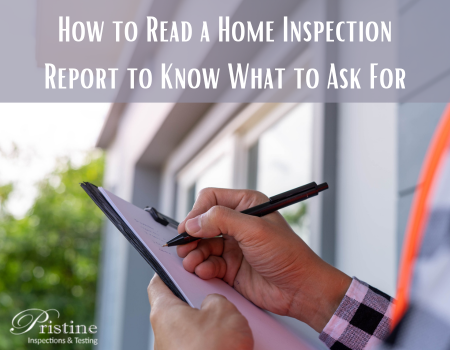Buying a home is one of the biggest financial decisions you’ll make, and a home inspection is a crucial step in the process. A home inspection report provides an in-depth look at the property’s condition, highlighting potential issues that could impact its value, safety, and maintenance costs. However, these reports can be lengthy and technical, making it challenging to determine which issues need immediate attention and what to ask the seller to address.
Understanding how to read a home inspection report will help you make informed decisions, prioritize necessary repairs, and negotiate effectively.
1. Understand the Layout of the Report
Most home inspection reports follow a structured format, including:
- Summary Section – A high-level overview of major concerns.
- Detailed Findings – A room-by-room or system-by-system breakdown.
- Photos and Diagrams – Visual evidence of problem areas.
- Severity Ratings – Indicating whether an issue is minor, moderate, or major.
- Recommendations – Suggested actions, such as repairs, replacements, or further evaluation.
Focusing on the summary section first will help you quickly identify the most critical issues.
2. Identify Major vs. Minor Issues
Not every issue in the report requires negotiation. It’s important to separate minor, cosmetic flaws from significant structural or safety concerns.
Major Issues to Address:
-
- Structural damage (foundation cracks, sagging rooflines).
- Electrical hazards (faulty wiring, outdated panels).
- Plumbing problems (leaks, pipe corrosion, water damage).
- HVAC system failures (malfunctioning furnace, broken air conditioning).
- Roof damage (missing shingles, leaks, extensive wear).
- Mold, pest infestations, or water intrusion.
Minor Issues You Can Handle Later:
-
- Small cracks in walls or ceilings.
- Peeling paint or outdated fixtures.
- Loose door handles or minor window issues.
- Landscaping concerns.
Focus your negotiations on major repairs that impact the home’s safety, livability, or future expenses.
3. Look for Safety Hazards
If the home inspection reveals safety hazards, these should be top priorities. Common safety concerns include:
- Electrical issues (exposed wires, outdated panels, missing GFCI outlets).
- Carbon monoxide or gas leaks (faulty water heaters, improper ventilation).
- Structural instability (damaged foundation, sagging floors).
- Mold and water damage (indicating potential long-term issues).
Sellers are often more willing to address safety hazards because they could affect financing and insurance approval.
4. Determine What to Ask the Seller to Fix
Once you’ve identified critical concerns, you can decide what to request from the seller. You generally have three options:
- Request Repairs – Request the seller to address the issue before closing the dea
- Request a Price Reduction – Negotiate a lower purchase price to cover the cost of repairs.
- Request a Credit at Closing – Have the seller provide a credit so you can handle repairs after purchase.
Sellers are more likely to agree to repairs if the issues affect the home’s structural integrity or marketability. However, they may push back on smaller or cosmetic concerns.
5. Consult Your Realtor and Inspector
Your real estate agent can help you determine which requests are reasonable based on market conditions. If the home is in high demand, asking for too many repairs may cause the seller to move on to another buyer.
Additionally, you can reach out to the home inspector for clarification on any unclear findings. They can help you understand the urgency of each issue and whether a specialist (such as a plumber or electrician) should be consulted.
6. Understand What the Seller is Not Required to Fix
In many cases, sellers are not obligated to fix everything in the report. This depends on:
- The terms of your contract.
- Local real estate laws and customs.
- Whether you’re buying the home “as-is.”
If the seller refuses to make repairs, you’ll need to decide whether you’re willing to take on the costs or walk away from the deal.
7. Prioritize Repairs and Negotiate Smartly
If multiple issues arise, focus on the most important ones instead of overwhelming the seller with a long list. Prioritize:
- Immediate safety concerns.
- High-cost repairs.
- Issues that could affect your ability to get financing or insurance.
A strategic approach increases the likelihood of the seller agreeing to your requests.
A home inspection report provides valuable insight into the condition of a property, but understanding how to interpret it is key to making informed decisions. Always consult with your real estate agent and inspector to determine the best approach, and be prepared to compromise on minor issues to secure your dream home.

